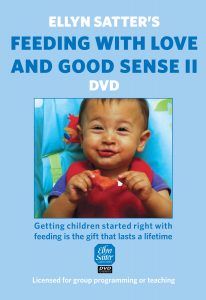

Family Meals Focus
The Ellyn Satter Institute Newsletter
Medication and the division of responsibility in feeding
by Ellyn Satter, Registered Dietitian Nutritionist and Family Therapist
This guest issue is from the mother of a 22-month-old who has cystic fibrosis and related severe acid reflux.
Bobby only took his medication when I tricked or forced him. But after we learned to make it his responsibility, he gives himself all four of his oral medications: I fill up the syringes with the proper dosages, hand them to Bobby, he puts the syringe in his mouth, depresses the plunger, and swallows all of his medications all by himself! I then hand him a spoonful of prunes with his enzymes mixed in and Bobby puts it in his mouth, swallows, and waits for the next spoonful – he has to take 5 pills for every meal.
I tricked and forced Bobby to take his cystic fibrosis medication
Only eight months ago, Bobby ate and took his medication only when I tricked or forced him. I was convinced something was wrong and had just returned from the hospital where Bobby was so resistant they couldn’t even do a swallow-test. The occupational therapist recommended Ellyn Satter’s books. As I read Child of Mine, I realized there was nothing wrong with Bobby – but with his mommy! I had heard about the division of responsibility in feeding before from my nutritionist, but I thought, “What kind of crazy lady would come up with that idea – Bobby MUST eat!”
The division of responsibility in feeding helped us with Bobby’s cystic fibrosis
This time I was convinced – at least about food, and I immediately changed my feeding approach. At first Bobby lost 1 pound, but by his next CF appointment, he had gotten the hang of eating and had gained the weight back. I was upbeat and excited, until the CF doctor expressed concern that Bobby had not gained any weight and mentioned the dreaded feeding tube. I panicked that night and almost reverted to my old tricks, but held firm, and we have continued to follow DOR. But medication was still a concern. How could I do a division of responsibility with that? Bobby had to have enzymes, and I was still getting them into him. I emailed Ms. Satter for advice, and she gave me step-by-step directions on laying out a mastery expectation for Bobby’s taking his medicines.
The division of responsibility in feeding doesn’t work for medicine
Understanding that this wasn’t just about the food or the medicine – but about whether my precious boy would live – allowed me to let him learn to eat and take responsibility for his medications.
Here it is: “You can’t use the division of responsibility in feeding for medicine. Bobby HAS to take it. Don’t force him. Instead, make it clear to him that taking the medicine is his job. Do this with medicine and with nothing else. Get yourself comfortable in front of Bobby. Have Bobby be confined to some sort of chair – preferably one you don’t use for feeding. Hold out the medicine to him – on a spoon, in a cup, in a syringe, whatever. Say, “this is your medicine. You need to take it.” Then keep it in front of him no matter what he does until he voluntarily takes it. Don’t try to put it in his mouth. Don’t try to trick him. Don’t back off. Don’t repeat yourself. Don’t get mad. Don’t cry. Don’t waffle or apologize. Change off with your partner if you need to. Just keep that mastery expectation in front of him. Bobby will try everything he can think of to get you off his trail, including flirting and screaming. Hang in there. This might go on for an hour the first time. After he takes it, say, MATTER OF FACTLY, “good for you Bobby.” Or some such. Do NOT praise lavishly. Each time will get a little shorter and more matter-or-fact.”
At first we had to hang in there for a long time
The first week was hell – or rather purgatory since I knew there would be paradise on the other side, given how well Ms. Satter’s guidance worked with Bobby’s food issues. For the first week, we spent three hours – one before each meal – until Bobby voluntarily opened and took his medication. But by week’s end, for the most part, Bobby was doing his medications quickly and without fuss. I must confess I had the evil thought, “wow this is great I can do this for all food!!” But I realized that if I did that I would wreck both his eating and his medicine-taking.
Satter acknowledged my fear: That Bobby wouldn’t survive
I can’t thank Ms. Satter enough – and not just for helping with Bobby’s medications, but for something she said in one of our first email exchanges: She said that of course there’ll be eating issues – you fear that Bobby wouldn’t survive. Throughout the travails of the first year-and-a-half with Bobby’s eating and medication issues, no one else had recognized that to me this wasn’t just about the food or the medicine – but about whether my precious baby would live. That understanding is what I needed to allow me to let Bobby do what he needed to do – learn to eat and take responsibility for his medications.
Explore
Understand and Apply ecSatter
To understand how to be faithful about doing your jobs with feeding and scrupulous about letting your child do her jobs with eating. read Ellyn Satter’s Child of Mine: Feeding with Love and Good Sense.

To see how children really behave with eating as well as to read about it, see Ellyn Satter’s Feeding with Love and Good Sense DVD II. For home use version, click here.

ESI position statements
Managing medical conditions with fdSatter and sDOR
